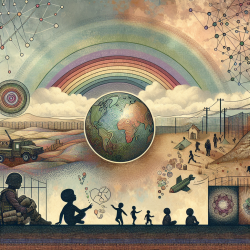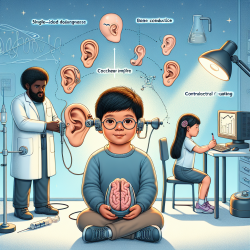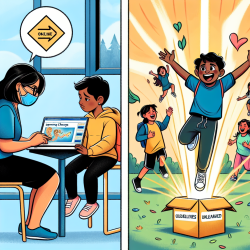Introduction
In the realm of speech-language pathology, understanding the psychological well-being of children is paramount, especially those living in conflict zones. The research article "Human (in)security and psychological well-being in Palestinian children living amidst military violence" by Veronese et al. (2022) provides critical insights into the psychological challenges faced by children in such environments. This blog aims to elucidate the findings of this research and offer practical applications for practitioners working with children in similar contexts.
Research Overview
The study conducted by Veronese et al. (2022) involved 75 Palestinian children from the West Bank and Gaza Strip. Through drawings and walk-along interviews, the researchers explored the interrelationships between perceived insecurity and children's psychological well-being. The study identified eight main themes influencing mental health:
- School and associativism
- Social relations and home as sources of security/insecurity
- Military occupation as a source of insecurity
- National and political identity as a source of safety
- Mosque and spirituality as sources of safety/unsafety
- Environment as a source of security/insecurity
- Mental health
Implications for Practitioners
Understanding these themes can significantly enhance the effectiveness of therapeutic interventions. Here are some ways practitioners can implement these findings:
- Holistic Assessment: Evaluate the child's environment, including school, home, and community, to identify sources of security and insecurity.
- Cultural Sensitivity: Recognize the importance of national and political identity, as well as spirituality, in the child's life. Tailor interventions to respect and incorporate these elements.
- Community Engagement: Collaborate with schools and community organizations to create supportive environments that mitigate insecurity.
- Resilience Building: Focus on enhancing the child's resilience by reinforcing positive social relations and providing psychological support.
Encouraging Further Research
The study by Veronese et al. (2022) underscores the complexity of psychological well-being in conflict zones. Practitioners are encouraged to engage in further research to explore the nuanced interactions between environmental factors and child development. Potential areas for future research include:
- Longitudinal studies to track the long-term impact of insecurity on psychological well-being.
- Comparative studies across different conflict zones to identify universal and context-specific factors.
- Intervention studies to evaluate the effectiveness of different therapeutic approaches.
Conclusion
Incorporating the insights from this research can empower practitioners to make data-driven decisions that enhance the psychological well-being of children in conflict zones. By understanding the intricate dynamics of human security and psychological functioning, practitioners can better support children in navigating their challenging environments.
To read the original research paper, please follow this link: Human (in)security and psychological well-being in Palestinian children living amidst military violence: A qualitative participatory research using interactive maps.










